
Negev Coexistence Forum for Civil Equality
פורום דו-קיום בנגב לשוויון אזרחי
منتدى التعايش السلمي في النقب من أجل المساواة المدنية
Local Advocacy and Activities
Our local advocacy efforts are focused on generating national campaigns and actions on the pressing issues of forced evictions and home demolitions, promoting the recognition of the villages, and social rights like employment and education as well as distributive justice of resources for all the residents of the Negev-Naqab.
Today, Bedouin citizens are broadly marginalized from decision making forums. For this reason, we facilitate encounters between local actors and community members, creating new spaces of dialogue where the needs of the communities can be expressed, and the voices of Bedouin women, raised up and heard.
Our advocacy actions to end discriminatory practices against the Bedouin citizens are enabled through side by side work with members of the Knesset, the regional municipalities of Neve Midbar and Al-Qassum, freedom of information requests from several governmental bodies, and fieldwork in partnership with other local grassroots organizations. Our successful partnerships have allowed us to jointly realize a common vision of equal civil rights, education and protection of the rights of women and children in the Naqab.
As part of these efforts, we produce research reports and thorough analysis that may bring about a change in policy making. We facilitate professional forums, and constantly appear before Parliamentary committees. In this regard, we seek to work with Bedouin women on lobby and advocacy skills, train them to speak to power and raise their demands for the benefit of their communities.
In previous years, the organization took part in extensive actions against the Prawer-Begin plan, opposition to the plan in the public sphere and in the Parliament, which eventually led to the cancellation of the plan.
Appeal to the Minister of Homeland Security to stop police escort to house demolitions in the Negev
On 26.7.2021 we sent a letter to Mr. Omer Bar Lev informing him of the 2,568 structures of Bedouins in the Negev were demolished in 2020 and the harmful economic damage this implies, to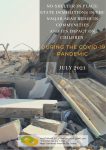 families that 80% of their children live in poverty. Thus, we requested him to order the cessation of police assistance for the demolition of structures until the governmental regulation plan (agreed with the coalition) is adopted and solutions are found for those whose homes were demolished. This move will help in building trust towards a dialogue with each of the villages on fair planning solutions, and build a political dialogue on regulation on the national level.
families that 80% of their children live in poverty. Thus, we requested him to order the cessation of police assistance for the demolition of structures until the governmental regulation plan (agreed with the coalition) is adopted and solutions are found for those whose homes were demolished. This move will help in building trust towards a dialogue with each of the villages on fair planning solutions, and build a political dialogue on regulation on the national level.
To continue reading click here
Women employment in Bedouin localities
On 25.7.21 we approached MK Aida Touma Suliman following our joint activities in the field of employment of Arab women in the Negev and following our letter to the Minister of Economy, Orna Barbibay, to provide assistance in creating employment offices in the Bedouin villages in the Negev. To access the letter please click here
Appeal to the Minister of Economy and Industry for the establishment of employment offices in the Bedouin localities
On 30.6.2021 we sent a letter to Mrs. Orna Barbibai as the responsible of employment services and the Five Year Plan for the Development of the Arab Bedouin communities, requesting her to establish new employment offices in the Bedouin localities. To continue reading the letter in Hebrew please click here
Appeal to the police for false arrests and police violence near the village of Saʿwah
On 22.2.2021, police forces made false arrests using excessive violence during a plowing operation near the village of Saʿwah.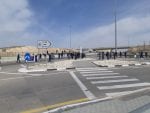
From evidence that came to us, it appears that the police made false arrests using violence and also imprisoned the detainees for over six hours on a detention bus without access to food and denied them access to medical care. The violation of the detainees’ rights continued, according to the evidence, even after the detainees were brought to a police station, where they were denied the right to consult a lawyer before the interrogation.
Most of the detainees were released immediately after being questioned on suspicion of “interfering with a police officer in the performance of his duties.” Beyond the arbitrary denial of the residents’ freedom, the right of protest of the activists was also denied.
In light of this, NCF together with the Israeli Association for Civil Rights, appealed to the Israel Police to investigate the incident and clarify the allegations regarding the violation of the detainees’ rights.
To continue reading letter in Hebrew please click here
Photo: Ella Gil from Sikkuy, 22.2.2021
NCF and the Israeli Association for Civil Rights, demanding to stop demolitions in the Naqab
10.3.2021
In 2020, 2,586 buildings were demolished in the Bedouin villages in the Negev. This represents a rise of 13% in demolition of structures compared to 2019. Despite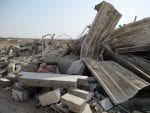 the humanitarian crisis caused by the COVID-19 pandemic, this is the highest number ever recorded of structures demolished in one year in the Arab Bedouin communities. This data was obtained from information NCF received from the Southern Administration for the Coordination of Enforcement of Land Laws.
the humanitarian crisis caused by the COVID-19 pandemic, this is the highest number ever recorded of structures demolished in one year in the Arab Bedouin communities. This data was obtained from information NCF received from the Southern Administration for the Coordination of Enforcement of Land Laws.
NCF found out that in a period of only six years, 11,513 structures were demolished in the Bedouin villages in the Negev, and the number of demolitions is growing noticeably each year.
Recently, the State began plowing fields used by Bedouin citizens for agriculture, harming their source of livelihood and food, their tradition and their connection to their lands. All this is done forcefully while the economy is still under restrictions, with thousands of children that lack access to the education system and adults who are still unemployed due to the Covid-19 pandemic. Last week, together with the Israeli Association for Civil Rights we contacted the Ministry of Justice and Ministry of Finance , and demanded to stop the demolition of houses as well as the damage to the agricultural crops of the Bedouin residents in the Negev.
To access the letter in Hebrew
The photo was taken by Amal Abu Kwider, az-Zarnūg, 15.09.2020
The residents of the unrecognized village of Khašim Zannih received the approval for a plan to build temporary portable structures for essential services, and in this case, educational institutions
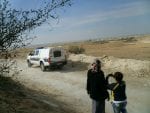
Thanks to the active local committee of Khašim Zannih that have led and will continue to lead a struggle for recognition of their village and access to basic services with the help of civil organizations, these buildings were approved. Until recently there was an intention to evacuate the village and its residents, but the local committee was determined and with a lot of resourcefulness. Together with Sikkuy and the Regional Council of Unrecognized Villages, an application was submitted for the establishment of a service center, which has now been approved. We hope that this achievement can be replicated in other villages and will also support the struggle of Khašim Zannih for recognition, and at the same time be an opening for the approval of the establishment of vital service centers in the other unrecognized villages.
This achievement is very important, and demonstrates that through activism, initiative, and organized communities that are connected to the work of grassroots organizations, policies can be changed.
Khašim Zannih, 4.1.2017 | Photo: Salam Abu-Khuti
Demanding the establishment of special quarantine facilities for Arab Bedouin 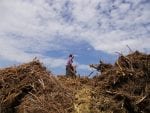 women in the Naqab
women in the Naqab
There is a need of a plan that will provide women from unrecognized villages in the Naqab with suitable isolation solutions in their villages, and which takes into account their unique way of life and needs.
There is a duty, and a criminal and administrative sanction can be imposed, whereby every corona patient or person who has been in contact with a patient, must enter into quarantine. However, dwellings in unrecognized villages do not allow for real isolation. The alternatives offered by the State include hotels, hostels, boarding homes and various public institutions. And yet, no alternatives were offered to fit the conditions and needs of women living in unrecognized villages – who are unable to self-quarantine in accordance with the Ministry of Health – leaving their families unprotected.
As of the end of 2020, no isolation facilities were established in the Bedouin townships, and the offered solutions were unsuitable for Muslim Bedouin women from the Naqab.
Photo: ʾAḥlām ʾAbū al-Qiʿān, ʿAtīr, 2015.
“The State in the Supreme Court’s verdict on remote learning: The poor are guilty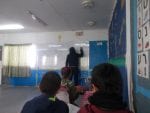 for their own situation”
for their own situation”
In April, together with Adalah, the RCUV and other representatives, we submitted a petition to the Supreme Court against the Ministry of Education, demanding that it remedy discrimination in the remote learning system.
Approximately 100,000 Bedouin students were denied access to education and their right to education was harmed during the crisis. But while the Jewish education system returns to full function, the education system in Bedouin localities is in halt and most children remain in their homes, without access to the remote learning system. On May 20, 2020, the Supreme Court rejected our petition, despite the fact that thousands of children in the Bedouin villages had not yet returned to school. The state, for its part, completely renounced its responsibility to provide equal education to all its citizens, placing the blame on Bedouin citizens who “chose” to live in the unrecognized villages and “chose” to be poor.(The quote is taken from an article in Hebrew by Gil Gretel, published in Local Conversations on the 21st of May 2020).
Photo by: Nāʾil ʾAbū al-Qiʿān, ʿAtīr, December 2016.
There is an urgent need to integrate Arab Bedouin women into the work force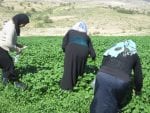
A telephone survey conducted by Ajeec during the COVID-19 lock-down, among Arab Bedouin women in the unrecognized villages, found that 40% of the women needed food supplies for their families,and 26% of the women said that they relied on on social security benefits.
The pandemic has led to an overall crisis in employment in the Bedouin communities in the Naqab, which could also lead to an increase in poverty rates. In a document we submitted together with Sidreh Association to the Special Committee on Welfare and Employment in the Knesset (May 12, 2020), we demanded that the government prepare a plan to promote the employment of Arab Bedouin workers in the Naqab, in particular the employment of Arab Bedouin women living in unrecognized villages.
Photo by: Rimāl Abu al-Qiʿān, Umm al-Ḥīrān, April 2016.
Demand for immediate reinforcement of bank’s branches in Bedouin localities!
In the midst of an economic crisis and the during the Ramadan fast – with thousands of families seeking to withdraw salaries and allowances – queues at banks and postal bank branches are mounting. Together with Sidreh Association, we contacted the Israeli Post Office and the Ministry of Communications, demanding immediate reinforcement of the Post Bank branches especially during the days of receiving salaries and allowances.
The shortage of bank branches is always an obstacle for Bedouins citizens, but during an economic crisis, when many more were added to the poverty cycle and unemployment, this becomes an urgent need. The state’s deliberate neglect of the seven townships over decades led to the highest poverty rate (66.6%) and the country’s highest unemployment rate, along with high crime rates and other socioeconomic problems.
NCF to the Ministry of Communication: Connect the unrecognized villages to internet and cellular infrastructure immediately
In response to the previous letter NCF sent to the Ministry of Communication, the Ministry implied that they are working towards improving the communication infrastructural in Bedouin communities in the Naqab, especially in light of the COVID-19 crisis.
However, as far as NCF is aware, the solutions offered does not concern the unrecognized villages. For this reason, on the 03.05.2020, NCF sent an additional letter to the Ministry of Communication, demanding the immediate provision of cellular and internet services to more than 90,000 Bedouin citizens living in unrecognized villages, so that they, much like any other citizen of Israel, can enjoy basic communication services.
NCF in an urgent request to the Ministry of Communication: Improve cellular 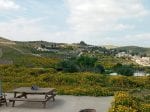 network in the Bedouin communities
network in the Bedouin communities
As part of NCF’s work to promote the accessibility of online/remote learning, we sent an urgent letter to the CEO of the Ministry of Communication, demanding that they improve cellular network in Bedouin villages and towns.
“This is particularly serious for students in socio-economic distress, as 76% of them
are located below the poverty line. Many of these students suffer from low achievement due to lack of adequate education and their schools are characterized by particularly high dropout rates. These students are often those who do not have computers and other equipment…”
Photo: Laila Alsaneh, al-Lagiyyih
Ensure Bedouin students’ access to online studies!
Over 100,000 Bedouin students, from elementary to university level, are currently being denied of their right to education. Without internet or electricity, as well as the absence of cellular reception in all the Bedouin villages, there is a real danger that the students will no longer return to the school bench, and that the existing gaps will only deepen. “Most homes don’t even have computers. There can be huge gaps that can’t be reduced”, says Khalid Altalka, chair of the Rahat Parents’ Committee.
In cooperation with students from various campuses, we addressed the urgent matter in a letter to the Council for Higher Education, demanding they imitate an immediate response – provide mobile modems, computers, close guidance to students in need and a plan to help students complete their school year. We were delighted to hear that Sapir College is already providing a variety of solutions to their students, and we have urged other colleges and universities to do the same. The Achva College in the Naqab also sent a similar letter, urging the Council to provide extra funding to purchase computers and other electronic devices for its Bedouin students.
We also submitted a petition to the Supreme Court this week, together with Adalah, demanding answers to students of all ages living in Bedouin villages.
Before disaster strikes:an urgent petition to the Israeli Supreme Court demanding 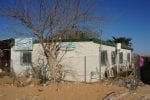 immediate access to Coronavirus testing in Bedouin villages
immediate access to Coronavirus testing in Bedouin villages
On the 14th of April the Supreme Court rejected our petition on the grounds that it will not intervene with the Ministry of Health’s work. However, one of the judges made important comments in which he noted that test should be done in unrecognized villages. We will continue to follow the issue.
Adalah’s Attorney, Sawsan Zaher, filed (1 April 2020) a petition on behalf of the Negev Coexistence Forum for Civil Equality, High Follow-Up Committee for Arab Citizens of Israel, the Arab Doctors Association in the Naqab, and the Regional Council for Unrecognized Villages in the Naqab.
The urgent petition to the Israeli Supreme Court called on Israeli authorities to immediately address the needs of Arab Bedouin communities the Naqab region now confronting the threat of the Coronavirus by providing testing centers and bolstered emergency ambulance services.
Photo: A medical clinic in the Bedouin village of Umm Batīn. Michal Rotem, 2014
NCF to the Ministry of Education Director General: Promote online learning  services in Bedouin villages in the Naqab (1 April)
services in Bedouin villages in the Naqab (1 April)
In cooperation with several Parents Committees from Bedouin villages and civil society organizations, NCF sent a letter to the Director General of the Ministry of Education, Mr. Samuel Abuhav, to request remote/online learning services in Bedouin communities in the Naqab.
Today, in most of the Bedouin villages, both recognized and unrecognized, there is no adequate access to internet service and many of the villages in the Regional Councils have been denied connection to the national electricity grid. Bedouin families who have computers and online subscriptions are numbered.
The major concern is that the current crisis will only deepen the huge gaps in education between Jews and Arabs: low rates of eligibility for high school diploma, low rates of eligibility for higher education, and high dropout rates.
Therefore, online studies are extremely important for Bedouin students to complete the current school year, and in order to prevent massive dropout.
Photo: Sabrin Abu Kaf, NCF’s coordinator.
NCF to the Ministry of Health: Take immediate action to prevent the spread of COVID-19 in Arab Bedouin villages
On the 26th of March, NCF and the Association of Arab Doctors in the Naqab (along with 17 civil society organizations) sent an urgent letter to Israeli officials, demanding immediate action to prevent the spread of the Coronavirus pandemic in the Arab Bedouin villages in the Naqab (You can find the translation of the letter to English here).
Some of the major concerns raised:
A. The physical conditions of dwellings in villages do not allow real isolation: large families live in densely populated quarters, in houses that are not fully isolated from the outside, and hardly any spaces that could enable the isolation of a patient from his family.
B. The sanitary conditions are dire due to the lack of basic infrastructure, particularly, the lack of running water.
C. The medical services in these villages are gravely lacking, especially in the unrecognized villages, with only four public healthcare clinics to serve them. For most of the population, the clinics are remote and inaccessible.
“We ask for the establishment, without delay, of an interdepartmental and interagency team, led by the Ministry of Health and financed with a special budget, to deal with the entire range of issues in the Arab Bedouin villages in the Naqab. This team will prepare an urgent strategic plan that will make use of a variety of means.”
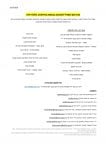 NCF in an urgent letter to the Attorney General: Stop home demolitions and crop destruction in the Bedouin community amid coronavirus!
NCF in an urgent letter to the Attorney General: Stop home demolitions and crop destruction in the Bedouin community amid coronavirus!
On March 19, 2020, NCF along with 22 other civil society organizations, sent a letter to Mr. Avichai Mandelblit, the Attorney General, requesting immediate cessation of the demolition of houses and crops in the Bedouin localities!
It is unimaginable that in the midst of a health crisis where people are required to stay in their homes – homes will be destroyed.
It is incomprehensible that in the midst of an economic crisis – the authorities will destroy crops, which is, for most, the only source of livelihood at the moment!
“The continued destruction of houses and crops during a health, social and economic crisis sends a clear message to the Bedouin citizens: that authorities are blind to their suffering and how discriminatory the policy is against them in relation to other communities”.
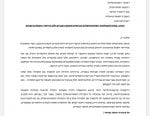 Online schooling with no electricity?
Online schooling with no electricity?
On March 17, 2020, a letter from Bedouin students was sent to Ben-Gurion University of the Negev, supported by NCF, demanding that the university find a solution for students from unrecognized villages who lack basic services, including connection to the national electricity grid. The state, which prevents basic services from over 90,000 residents in the unrecognized villages, does not provide them with electricity services on a regular basis. However, during the coronavirus crisis, students are requested to study from home, online. The letter requested the university find a suitable solution to hundreds of Bedouin students who are not connected to electricity and internet.
Public Activities
We are constantly working to inform the public in Israel and abroad about the injustices committed towards the Bedouin society in the Negev/Naqab, as we believe that the long-term violations of social and human rights are also made possible due to the lack of public interest in the community, and the lack of accurate public information. The Israeli public is being fed false information.
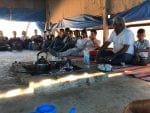 Alternative Negev/Naqab Tours
Alternative Negev/Naqab Tours
Join us to learn about the Bedouin society and to meet the leaders of the unrecognized villages. Come and visit the Negev/Naqab from their point of view, get to know the roots of the southern struggle for civil equality, and see the injustice and human rights violations in your own eyes.
 Lectures and Workshops
Lectures and Workshops
NCF’s activists speak every year to dozens of diverse groups in various frameworks. We will also be happy to talk to you about the situation in the Negev/Naqab, the human rights violations of the Bedouin community and the history of the struggle in the country’s southern region. To coordinate a lecture, workshop or home class, please contact us at: tours@dukium.org.
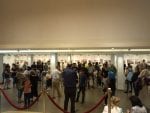 Exhibitions
Exhibitions
The products of our documentation projects are presented in a variety of spaces in Israel and abroad.
Yuṣawiruna – Photographing for Human Rights Project, are an original and exceptional testimonies from the Negev/Naqab. Our team work alongside an amazing group of women from the unrecognized villages in various photography classes and training. Together, the women form a wide network of human rights defenders. They share their everyday lives , both the good and the bad, and the project enables them to take a larger part in their communities’ struggles for recognition.
The children in our documentation project Through a Child’s Lens, are witnesses of the harsh reality, and cameras are a source of strength for them.
Recognized- Documenting Life in the Negev, is NCF’s video documentation project. In 2015, NCF started to distribute video cameras and train volunteer photographers in the unrecognized villages to document, from their perspective, the human rights violations that occur in their villages.
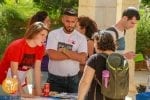 Local Advocacy
Local Advocacy
NCF works to promote civic equality in the Negev/Naqab – to eradicate racist policies and to end discrimination against Bedouin citizens in all spheres of life. For this purpose, constant work is done with policymakers in the Knesset (Israel’s Parliament), government ministries, local authorities, and among various level of decision-makeing. We hold meetings and lectures, invite them out for tours and meetings with Bedouin residents from the region, distribute position papers, speak in various Knesset committees and more.
In the past, publications and reports that we wrote led to discussions in various committees in the Knesset and important visits to the Negev/Naqab of these committees. For example, during 2016, members of the State Audit Committee participated in a tour with NCF and held discussions following the report Community under Attack: The Human Rights Situation of the Bedouin Community in the Negev .
In previous years, the organization took part in extensive actions against the Prawer-Begin plan, opposition to the plan in the public sphere and in the Parliament, which eventually led to the cancellation of the plan.
2019
Emergency Conference in Rahat: “Ministry of Education must prevent cancellation of education program for Bedouin women”
On Monday, August 5 from 9:30 to 12:00, a public conference was held at the Rahat Community Center,
as part of the campaign to prevent the program from being closed by the Ministry of Education at the beginning of the school year. In previous years, the program encompassed 25 classrooms a year and accommodated 450 students, 90% of whom were women in need of basic education and a matriculation certificate. This year, only nine classes operated, and this was only due to public pressure exerted on the Ministry of Education. NCF and Sidreh, a Bedouin women organization, stated: “It is impossible that a ministry that has a budget of NIS 60 billion cannot find 2.5 million for Bedouin women that have been subject of neglect and discrimination for decades.”
Among the participants were Members of Knesset; program coordinators and staff; academics and researchers from the community; local leaders; women’s organizations and activists; and of course, the participants of the program themselves.
MK Aida Touma-Suleiman from the Joint Arab List: The State must take responsibility and increase its allocation of budgets for education and employment services for Arab Bedouin women.
MK Gadeer Kamal Mreeh, Blue and White Political Alliance: “The Ministry of Education did not raise a demand, the Ministry of Finance did not know, and a Government Resolution was passed without this important program! As part of the fight against the cancellation of the program, I contacted the Ministry of Education and the Ministry of Finance in an official letter, demanding that the issue be jointly and seriously re-examined, in order to find a solution, and to reactivate the program as soon as possible.”
Professor Yifat Bitton, the Democratic Camp: It’s outrageous that the Israeli Government gives money to programs and then slowly dries them out. It is embarrassing that we need to gather here for a budget of only NIS 2.5 million when the damages caused by discrimination against a Bedouin woman reaches NIS 2 million. It is important to speak about both distributive justice and economic logic. These two require not only that the plan continue but that it is also be expanded.
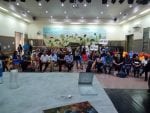
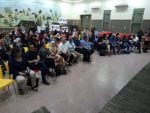

An urgent appeal to the Israeli Government and the IDF: Establish bomb shelters in the Bedouin communities of the Negev/Naqab, before the next tragedy
The Negev Coexistence Forum for Civil Equality (NCF) and the Regional Council for the Unrecognized Villages in the Negev (RCUV) released an urgent letter today (Wednesday) to officials from the Government and the IDF, demanding an immediate and adequate response to the absence of bomb shelters in the Arab Bedouin villages in the Negev/Naqab, both recognized and unrecognized by the State of Israel. This was as a result of the recent escalation this week between Israel and Gaza, during which it became clear once more that hundreds of thousands of Arab-Bedouin citizens of the state are left without any shelter during emergencies and are completely exposed to the missile threat. “This is negligence in the highest degree. The state has known for years and years that this is the case and does nothing to change it”.
The letter was sent to the Prime Minister and the Minister of Defense Mr. Binyamin Netanyahu; Minister of Public Security Mr. Gilad Erdan; Lieutenant General Aviv Kochavi; and the Home Front Commander, Major Tamir Yadai. The letter is backed by data collected as part of the submission of a petition on the subject by the Association for Civil Rights in Israel (ACRI) in 2014, as well as the State Comptroller’s report from 2018, which pointed-out to extreme gaps in protecting the Arab communities and the Arab-Bedouin community in the Negev/Naqab in particular, during emergencies. The letter presents the accusation that although the state is aware of the serious problem, nothing has been done except the promotion of shelters in public schools and clinics, and that 80,000 residents of the unrecognized villages in the Negev/Naqab, who have no access to a bomb shelters at all, remain completely transparent to the government.
During Operation Protective Edge, a rocket hit the entrance to a family home in the unrecognized village of Al Wadij near Dimona, killing four people and injuring four members of the family. Another rocket hit a house in the unrecognized village of ʿAwajān near Lagiyyih, injuring two young girls. In the current round of violence, a rocket hit a house in the town of Lagiyyih and wounded two people. Ziyad al-Hamamdeh, a resident of the unrecognized village of Ṣwāwīn, who was killed by a rocket in Ashkelon, also came from a village without any means of protection. One of his relatives told YNET that the late Hamamdeh told him on the morning of the day he was killed before leaving for work in Ashkelon that “our whole area is in danger and we have no shelters to run to if anything should happen. So, I’ll go to my workplace and continue the day as usual”. In all the cases mentioned, the residents of the villages did not have a bomb shelter, and the Iron Dome does not intercept rockets aimed at “open spaces”, where most of the unrecognized villages are situated.
The organizations also emphasized that there are serious gaps between the number of pupils and teachers in the schools and the capacity of the bomb shelters located in the educational institutions, and that many schools are composed of mobile structures only, so that there is no protected space at all. “It is an absurd situation in which the state is aware of the danger but does nothing, and when a family living in a Bedouin village hears the siren that often comes from the nearby Jewish community, there is nothing left for them to do but pray. It is It is inconceivable that the authorities are stumping on their basic right to life – this is negligence at the highest level, which will cause trauma and more losses of life”, said Haia Noach, Executive Director of the Negev Coexistence Forum for Civil Equality.
An Official Complaint Letter to Israel’s Broadcasting Authority
on the 16th of June, 2019, NCF issued a formal complaint letter to the Broadcasting Authority in Israel regarding the racist and inflammatory remarks made by Dr. Yitzhak Noy on his radio program, as part of the “Shavuot Special”.
In the second part of the program, Yitzhak Noy interviewed Dr. Yitzhak Clinton Bailey, a renowned researcher of the Bedouin population in Israel. Unfortunately, instead of focusing on his research and books, he chose to use the opportunity to incite against the Arab Bedouin citizens of Israel. During the program, Yitzhak Noy presented Bailey with offensive, racist and prejudiced questions about the Arab Bedouin society.
For example, at the start of the interview Noy said: “… (Israelis) quite a few do not like them, there are quite a few among us who think that they constitute a danger to the existence of the State of Israel, in their reproduction, in their culture, in their pursuit of radical Islam”. In the second part of interview, Noy continued with his racist incitement. While Dr. Bailey wished to speak about the Bedouin culture of hospitality and about Arab Bedouin poetry, Noy decided to ask him the following: “Some of the Israelis are panic-stricken, because the Bedouin are known as first-rate murderers… “.
NCF filed a formal complaint with the Broadcasting Authority as a result of Yitzhak Noy’s remarks, asking him to apologize immediately for his abusive comments. Declaring an entire population as “murderers” and “existential threat” is racist and such remarks have no place in a democratic society. They are dangerous and inflammatory and should be condemned.
UPDATE: On the 26th of June 2019, Yitzhak Noy was suspended from his radio show.
2017-2018
The Coalition for Strengthening the Negev Cities
Government Resolution No. 748, entitled “Examination of the Establishment of New Settlements in the Naqab”, was adopted on November 22, 2015, with the aim of promoting the establishment of five new community settlements in the Negev/Naqab in order to increase the population in the area and attract additional communities to settle in the Negev/Naqab. The proposed plan had far-reaching implications for the future of the Negev/Naqab in general, and for Arab Bedouin citizens in the area in particular. Therefore, the Coalition for Strengthening the Negev Cities opposes the said plan and called to stop all plans for new settlements immediately. Instead, the organizations demanded authorities expand and strengthen existing settlements in the Negev/Naqab, which are in need of infrastructure, as well as to act for the recognition and planning of the unrecognized Bedouin villages, which are in desperate need of basic infrastructure, planning and development plans.
Fortunately, on July 24 2008, the Committee for Planning Issues in Jerusalem decided to disqualify four of the six settlements that the Ministry of Construction and Housing sought to establish in the Negev/Naqab.
The establishment of small communities for the rich, most of them exclusively for Jews, is harming tens of thousands of Bedouin in the Negev/Naqab who have been struggling to be recognized for decades, since the establishment of the State of Israel.
Our partners:
The Society for the Protection of Nature in Israel
The Association for Civil Rights in Israel


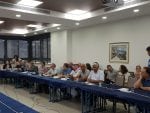
MAZON Fund Coalition
MAZON Fund is an American fund that operates in the United States and Israel to fight the causes of hunger and poverty.
The Coalition’s Acitvities:
The Negev Bedouin community suffers from abject poverty and food insecurity and is at the bottom of the socio-economic ladder in Israel. In cooperation with a large number of organizations, the Forum for Coexistence works to improve the economic and social situation of tens of thousands of Bedouins in the Negev with the help of local lobbying and advocacy, such as the employment of Arab Bedouin women, improving access roads and public transportation.
Our Partners:
Regional Council for the Unrecognized Villages
Arab-Bedouin Women Employment Conference
The Bedouin communities in the Negev/Naqab suffer from economic hardship and severe poverty. A major difficulty is reflected in the labor market, where many members of the community suffer from inferiority in competition for job placements, exclusion and discrimination, among other reasons. As women from an ethnic minority, Bedouin women in the Negev/Naqab are subject to dual discrimination and exclusion, which forces them into poverty, unemployment or low-wage employment and under inappropriate conditions.
About the conference:
The Arab-Bedouin Women’s Employment Conference was supported by MAZON Fund . and in cooperation with Yedid in Rahat and Sidreh, the Desert Embroidery Society.
As part of the conference, we discussed the main obstacles that make it difficult for Arab -Bedouin women in the Negev/Naqab to integrate into the labor market. In addition, we presented to the general public testimonies of Bedouin women from the recognized villages, the governmental townships and the unrecognized villages, about their daily struggles with discrimination, racism, poor education, lack of public transportation and lack of jobs.
The conference was attended by women and professionals from various government ministries and members of the Knesset (MK Ida Touma Suleiman, Chairperson of the Committee for the Advancement of the Status of Women and Gender Equality in the Knesset); MK Ahmed Tibi, MK Michal Rozin, Meretz faction).
MK Michal Rozin signed the conference: “I believe that you should have proper representation. I want to see a Bedouin woman not only in the local authorities, but also in the Knesset, and even in the government, inshallah! “
Position paper: Perspectives on Arab-Bedouin Women Employment in the Negev/Naqab | September 2018
“Perspectives on Arab-Bedouin Women Employment in the Negev/Naqab” | March 2018
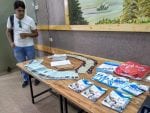
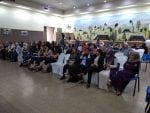
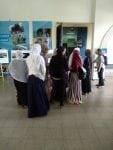
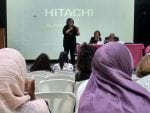
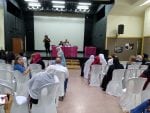
A Public Campaign to return the Funding for the Program for Completion of Education for Adults from the Bedouin Community
As part of our advocacy project promoting Arab Bedouin women’s employment, NCF found that the Ministry of Education intends to stop funding the program to complete education that mostly serves Arab Bedouin women from the Negev/Naqab (95% of the participants).
The program provides primary education for non-literate women, as well as completion of education up to a matriculation certificate for women who dropped out of school or did not have access to basic education.
NCF initiated a public campaign, which included a petition (in partnership with Zazim), signed by more than 620 citizens; a letter on behalf of five organizations (Sidreh, Shatil, Adva Center, AlHuquq Center) to the Minister of Education Naftali Bennet, Minister of Economy Haim Katz, Minister of Agriculture Uri Ariel. A second letter on behalf of six Members of Knesset (Israel’s Parliament) was also sent to the Minister of Education; the distribution of a position paper and other publications in the media.
During an initiated deliberation in the Education Committee, MKs Merav Ben-Ari, Mossi Raz, Yossi Yonha, and Said al-Harumi, more than 10 MKs from all the political spectrum, demanded that the funding be restored for the program and acknowledged the necessity of such programs for Bedouin women.
*This campaign is still ongoing in 2019


 Youtube
Youtube
 Twitter
Twitter
 Facebook
Facebook